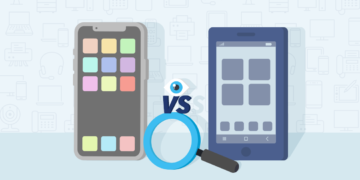
Smart glasses are paving the way for more immersive technology, but they also pose privacy risks. Our cybersecurity experts assessed three of the most popular smart glasses — the Apple Vision Pro, Meta Ray-Bans, and Amazon Echo Glasses — and identified the following privacy risks:
- Extensive biometric data collection, including eye-tracking and voice recordings
- Security vulnerabilities in software that hackers can exploit
- Data sharing with (unknown) third parties
- Collection of multiple data points from other devices in your house
Handing over all this data to companies makes you much more vulnerable to targeted ads and cyber attacks — if this information falls into the wrong hands.
We recommend taking control of your privacy by using a data removal service to wipe your information from the databases of different companies. Incogni contacts almost all the major data brokers on your behalf and gets them to wipe any sensitive data they’ve collected about you.
Continue reading to learn more about the privacy risks of popular smart glasses, like the Apple Vision Pro, Amazon Echo Frames, and Ray-Ban smart glasses.
Smart glasses are making a comeback. Despite earlier failures, like the Google Glasses, smart glasses are one of the hottest gadgets today.
Did you know that smart glasses can put your privacy at risk? Yes, smart glasses collect loads of sensitive data about you. And, if you don’t take steps to limit who can access this data, they could end up in the hands of unscrupulous advertisers and cybercriminals.
We recommend using a data removal service to scrape your private information off the web. Incogni is our top-rated data removal service. It reaches out to over 180 major data brokers to wipe your data from their databases.
Below, we look at the privacy risks of the Apple Vision Pro, the Meta Ray-Ban smart glasses, and the Amazon Echo Frames.
The Most Common Privacy Risks of Smart Glasses
Smart glasses offer a cutting-edge, immersive experience. They allow you to record a video with voice controls, look up information on the go, and do so much more. But they’re not without risks.
According to security researchers at Cornell University, smart glasses create serious privacy concerns for the people in front of the lenses, who can be captured on camera without their consent.
It’s not just those in front of smart glasses who have to contend with the invasion of their privacy. Users of smart glasses are also subject to invasive data collection.

Let’s take a closer look at some of the privacy risks of smart glasses.
Data collection
Regardless of the model you use, smart glasses collect a lot of data. This can range from relatively harmless information to more private personal data, including:
- Video and audio of your surroundings
- Location data
- Status of connected technology, including phones
- Data from connected software
- Biometrics
This data reveals sensitive information about your life in the real world: where you go, what you look like, what you’re interested in, your medical information, financial information, and more. Advertisers are hungry for this type of data, which they use to deliver targeted ads.
Since smart glasses are still new to the market, a lot of details about how they collect and process data are still unclear. For example, where does the data go? How is it stored? Which third parties have access to it? This creates additional security risks.
Security vulnerabilities
Smart glasses could be a gold mine for cybercriminals. All new software is vulnerable to malicious use. Hackers are known to search for and exploit software vulnerabilities to get their hands on private information.
While hacking into smart glasses, AR glasses, and other VR/AR devices is difficult, it is not unheard of. Research by cybersecurity experts at LSU shows that smart glasses are vulnerable to external tampering.
Moreover, if other devices are linked to your smart glasses, they can become a gateway to your social media, email, financial details, work documents, and more.
Popular Smart Glasses and Their Privacy Risks
Below, we review some popular smart glasses and highlight their privacy risks.
But what are smart glasses? In essence, smart glasses are wearable devices that use augmented reality (AR) technology to create a hands-free online experience. In some cases, smart glasses will look like ordinary glasses. You can even get prescription lenses on some models!
While the potential for smart glasses is huge, their privacy risks are not to be overlooked.

Apple Vision Pro
Apple’s Vision Pro is a groundbreaking mixed-reality headset. It offers one the most immersive user experiences on the smart glasses market, with users able to perform actions through eye movements and minimal finger taps.
Out of all the smart glasses with cameras, the Apple Vision Pro takes the crown — its 3D cameras are unmatched! Of course, that’s also the source of the main privacy concerns with this device.
- Advanced eye-tracking technology allows users to create an avatar of themselves that reflects their expressions in real time. The type of facial recognition and biometric data collection necessary to execute this is very invasive.
- Voice data is generated through user interactions with others. There’s a risk that malicious actors can get hold of users’ voice commands and use them to access highly sensitive information or orchestrate voice phishing attacks.
Motion tracking and voice data can also be used to create deepfakes. With two depth sensors, twelve cameras, and six microphones, the Apple Vision Pro is constantly scanning your surroundings and tracking your home, workplace, and any other place you use the device.
What does Apple say?
Generally, users don’t have to worry about Apple’s privacy practices as the company is known for its closed system and privacy-first approach. Besides, there are usually ample controls in Apple’s data and privacy settings. With regard to data collection by the Vision Pro, Apple says:
- Optic ID, which is used for eye-tracking, is encrypted and never leaves the device.
- Eye-tracking data is not shared with third-party apps.
While these promises might ease some of your worries, they’re not foolproof. Your data is still stored internally on Apple’s systems, which can still be breached.
Also, the sheer amount of data the Apple Vision Pro collects sets a precedent that’s almost impossible to regulate.
Apple has been expanding its network of ad partners in recent years, and these companies are all eager to get their hands on as much information as they can. Location data, voice data, and data about our surroundings provide an eerily detailed picture of our lives.
Ray-Ban Meta Glasses
How about the Meta’s smart classes? Also known as the Meta Ray-Ban smart glasses, the glasses are integrated with a Meta AI assistant, which processes audio and videos and produces text and audio output. You simply need to say “Hey Meta” to summon the AI assistant.
This model is an update to the Ray-Ban Stories. While the idea of AI-supported smart glasses might sound exciting, here are some privacy concerns to keep in mind:
- Every photo you take with the Meta Ray-Ban glasses is stored and used to train the AI assistant. This poses serious threats to people’s privacy and security.
- Meta will collect “essential” data such as your Wi-Fi connectivity, OS version, and even crash errors. On top of that, “additional” data may be collected, including your location data and usage analytics.
When people are being photographed or filmed, the glasses have a tiny LED light that is activated to signal that the camera is on. However, when taking photos, the light appears only briefly and is barely noticeable. This raises concerns about surveillance and consent.
Amazon Echo Frames
Amazon also has a pair of smart glasses known as the Amazon Echo Frames. These smart glasses don’t have a camera, but they offer a directional audio connection to the Alexa app via the so-called Echo speaker.
Without built-in cameras, are there still privacy risks to the Echo glasses? Unfortunately, yes.
The functionality of the Alexa commands is dependent on Alexa Skills apps. Many of the Alexa Skills apps (there are over 100,000 of them) are developed by third parties. This creates a chain of Alexa data collection that’s impossible to keep track of.
Amazon claims that it doesn’t sell your personal to others. However, considering the company’s retail power, this is an empty claim, as Amazon can use your data to advertise its products to you. Ultimately, your private data is still collected for targeted ads and monetization.
Moreover, Amazon has a bad track record when it comes to privacy. Its Ring cameras have been criticized for poor security that allows Amazon employees to spy on customers. The company has also been charged with violating children’s privacy laws.
Due to Alexa privacy issues, the new Echo Frames are not high up on our list of smart eyewear to invest in.
How to Protect Your Privacy When Using Smart Glasses
Considering the amount of data smart glasses collect, it can be a challenge to protect your privacy. Here are some tips to safeguard your privacy when using smart glasses:

- Limit third-party data collection to the extent that it’s possible. You want to limit data-sharing as much as you can. Pay close attention when your smart glasses request third-party access to an app or service.
- Turn off interest-based ads in your browser and in the apps you use. This will limit the connections your smart glasses can make between your data points.
- Use strong passwords on all your accounts. This makes it more difficult for hackers to breach your private accounts.
- When asked to allow voice recordings, videos, and images to be stored, always opt out. This won’t usually stop you from being able to use a voice command to operate the device.
- Make sure to update your apps regularly to receive the latest patches for possible security vulnerabilities.
If you want complete control over your personal data, we highly recommend looking into a data removal service. One of the best ones we’ve reviewed is Incogni.
Incogni contacts over 180 data brokers and requests the removal of your personal information from their databases. Should any of the data collected by your smart glasses end up with data brokers, Incogni will track it down and make sure it gets removed.
Limit the Privacy Risks of Smart Glasses
Smart glasses like the Apple Vision Pro and Meta Ray-Bans represent a landmark technological feat! While they can be useful, knowing the privacy issues with some of these smart frames can help you make informed decisions.
The main privacy risks linked with smart glasses include:
- Biometric data collection (voice recordings, eye-tracking)
- Security vulnerabilities that hackers may exploit
- Data shared with (unknown) third parties
- Continuous data collection from multiple devices and data points
If you want more control over your online data, you can use Incogni to wipe your data from broker’s databases.
Want to know more about smart devices and their privacy risks? Check out the articles below:
- Smartphone Privacy: Understand the Risks and Protect Yourself
- The Privacy Risks of Fitness Trackers
- How Safe is the Meta Quest 2?
Do you have questions about the privacy of smart glasses? Have a look at our FAQ below!
Google Glass was discontinued due to privacy concerns over its always-on cameras and microphones that could be used to record people without their knowledge and/or consent.
The risks of smart glasses include:
- Excessive data collection of biometric data (eye-tracking, voice)
- Data collection from clusters of devices
- Security vulnerabilities that allow hackers to get access
- Data-sharing with third parties
While it might be difficult, smart glasses can certainly get hacked. Researchers at LSU have demonstrated that smart glasses can be tampered with externally.
The main ethical issue with smart glasses is that people can be filmed or photographed without their consent. Even the Amazon Echo Frames have this issue: while it doesn’t have a camera, people’s voices can still be recorded without them knowing.
Depending on where you live, this may be a violation of privacy.




